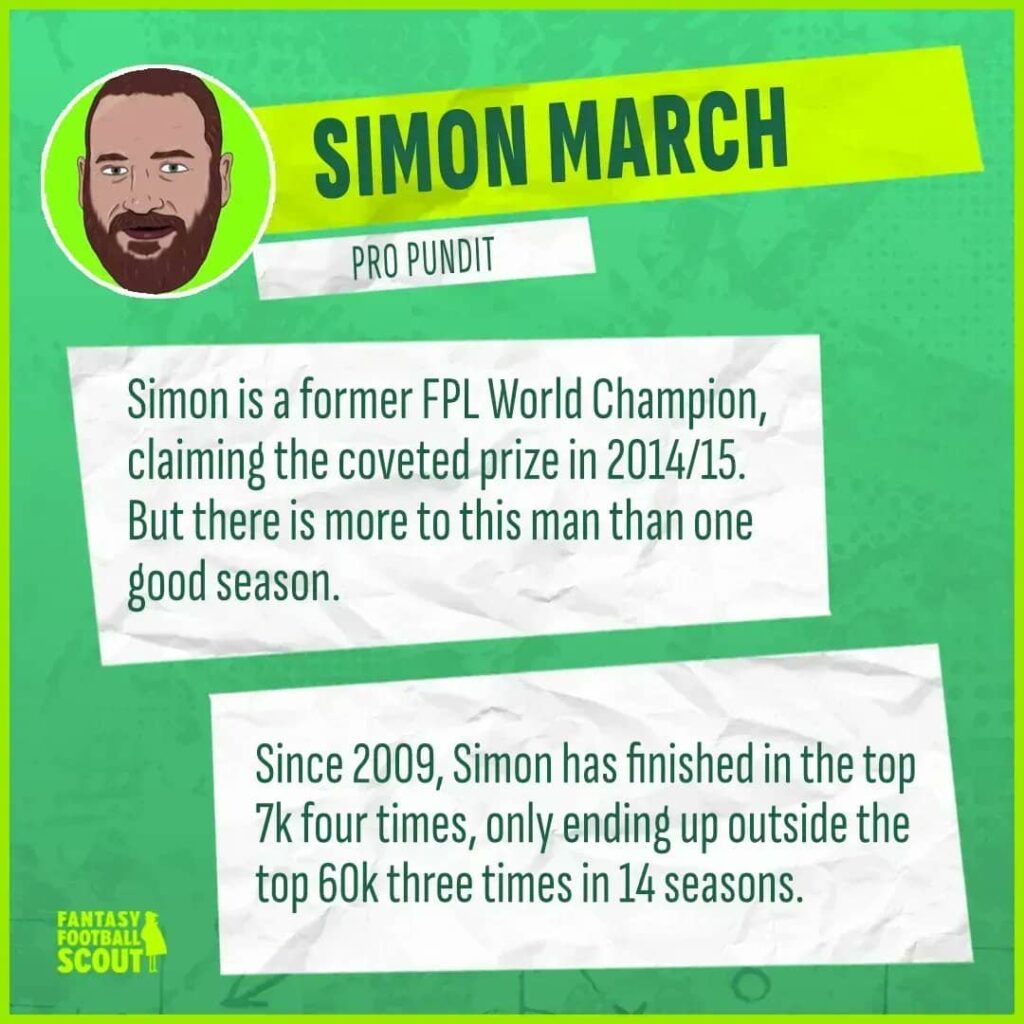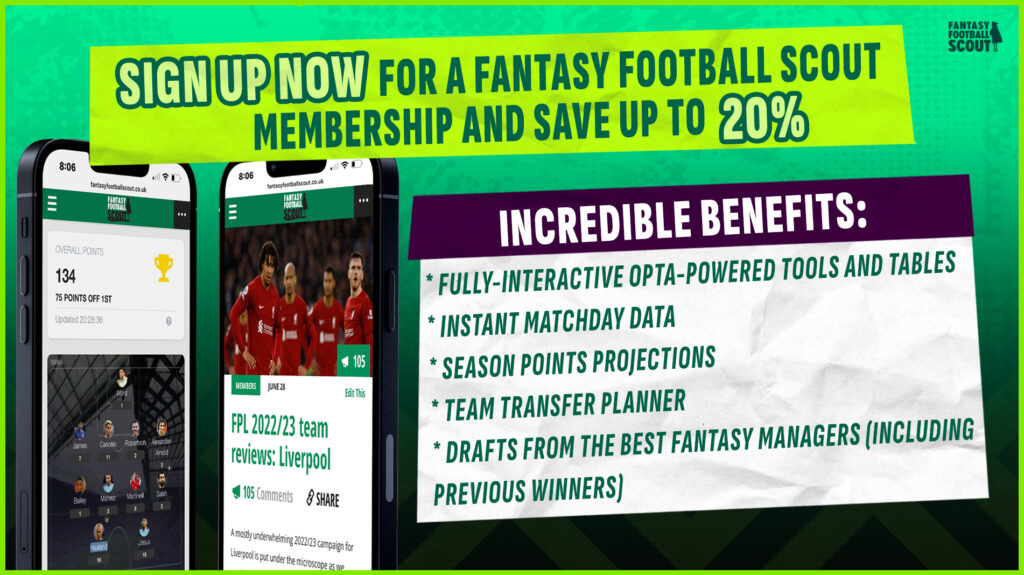Our team of Hall of Famers and guest writers are offering regular contributions throughout the 2023/24 Fantasy Premier League (FPL) campaign. Here, former champion Simon March muses on the current trend of ‘copying’ teams.

Along with the proliferation of FPL content creation has come the dubious trend of directly copying a content creator’s team week to week as a shortcut means of achieving a good rank and, perhaps, winning some mini-leagues.
The practice is generally maligned within the FPL community, critics argue that it is not within the spirit of the game, rivals see it as cheating and content creators usually find it at least a bit annoying, not least due to the added pressure it sends their way. But is there a positive side to copying someone else’s team? This will be the subject of this week’s article.
The case against copying someone else’s team
The most obvious argument against copying somebody else’s team is that it is obviously cheating. If, for example, you were playing a game of chess and grandmaster Magnus Carlsen was dictating all of your moves for you, that would be cheating. Indeed, if you were playing FPL and Magnus Carlsen was dictating all of your moves for you, that would also probably be cheating, since he’s known to be pretty good at FPL too. If fairness matters at all in FPL, then copying somebody else’s team is inherently wrong and it is at least questionable whether you can ever feel any genuine satisfaction in an achievement gained this way.
Slightly more pragmatically from the point of view of the copier, copying somebody else’s team can be (perhaps ironically) quite labour-intensive and even a bit stressful. You can’t make your changes until the person you’re copying announces theirs and you might need to follow all their content up to the deadline in order to find out what those changes are. Copying a team directly becomes even more difficult when you factor in price changes and the possibility that you might end up working off a different budget than your chosen influencer.
Furthermore, there’s no guarantee that it will succeed. Even the best FPL managers have their off years and so, even though the odds are probably in your favour, you might not necessarily do better by copying than if you’d made your own decisions.
Finally, many believe that we learn the most from our own mistakes and, if we don’t make those mistakes ourselves, we don’t learn how to avoid them in the future. Of course, as FPL managers, we usually prefer to just make those same mistakes over and over again, but that’s a different matter. While copying somebody else’s team in the short-term might yield better results than you might achieve by yourself, it might not actually help you grow or get better at FPL yourself.
Oh, and I almost forgot. Copying someone else’s team – it’s not exactly fun, is it?
The case in favour of copying someone else’s team
Starting with the most obvious, the main benefit of copying somebody else’s team is that, if that person is better at FPL than you are, you are likely to do better than if you didn’t copy them. That is, of course, why the majority of people who do it, do it.
But there is a secondary argument that, perhaps, copying someone else’s team might actually make you better at FPL in the long run. Whether you’re trading shares, trying to beat a boss in a video game or attempting to fix your own plumbing, it’s quite normal to seek out guidance from those with more developed skills and experience. Indeed, this is fundamentally the purpose of FPL content in general; to take the opinions of others and use them to inform our own decisions for the better. Those who copy a team directly might be taking this to a rather extreme degree, but all of us who consume FPL content are, on some level, allowing other minds to influence ours.
While it might, indeed, be beneficial for us to experience the consequences of our own mistakes, the prevalent learning models in society, be it in the classroom, apprenticeships or ‘shadowing’, are all built around minimising those mistakes. If an FPL manager follows a more experienced FPL manager’s decisions forensically for a whole season in order to copy them, they’ll almost certainly learn something and, quite possibly, they’ll learn to avoid certain mistakes along the way. In all honesty, if we had the option of becoming the FPL managers we are today more quickly and forgo the excruciating crucible of pain and despair that characterises an FPL manager’s journey, wouldn’t we be a least a bit tempted?
Finally, and this is perhaps a little Machiavellian, there are strategic benefits to being regarded as the best player in your mini-league. In particular, your rivals tend to pay more attention to your team and this fixation can cause them to make mistakes. Even if they are an objectively better player, if they perceive you as a better player, it will cause them to question their own decisions and start reacting to yours instead. Once you are dictating your rivals’ moves, you’ve more or less beaten them already.
Conclusion
In summary, copying somebody else’s team is cheating, might not work and could well limit your growth as an FPL manager in the long term. Indeed, I’d say that removing your own agency, and thus deferring the consequences of your action onto somebody else, reduces your overall experience of the game to the point where it is questionable whether it is even worth playing it at all. If you can’t enjoy the highs or experience the lows, what exactly is the point?
The counter-argument, of course, is that if you are bad at FPL, then copying somebody who is good at FPL is an entirely rational thing to do. Though you could also argue that the even more rational thing to do would be to find something that you are good at and do that instead. Or, at least, to just get better at FPL.
However, if we consume FPL content at all, we are at least open to the idea of our FPL decisions being influenced by others and you could therefore argue that all those who do are somewhere on the ‘copying somebody else’s team/strategy’ spectrum already. In the end, from a moral perspective, it comes down to a matter of degree and the defining lines are, perhaps, not as explicit as we might believe.
There’s an argument at least that paying extremely close attention to a much better FPL manager’s team could be the best and most efficient way to learn how to play the game well. If you only plan to do it for, say, a season, then maybe it’s not such a bad thing after all, practically speaking, at least.
Finally, being the best in your mini-league, even if it’s just for a season, can change the dynamics of that league for at least another season. You don’t have to cheat and copy a better player’s team forever in order to become the de facto dominant player, though you did still cheat to get there, of course.

